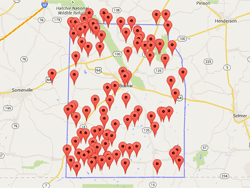In Memoriam
From a funeral sermon in honor of Mr. James WOOD, preached at Mt. Bethany Church, Hardeman county, Tenn., May the 20th, 1867 by Rev. W. H. THOMPSON, pastor.
In conclusion Brethren, we have a pleasing and, at the same time, a difficult duty to perform. To speak with entire truthfulness of one whom we have so well-known, and so sincerely admired, is by no means as easy task. The custom of the pulpit in magnifying the virtues of the dead, or ascribing to them qualities which they never possessed while living, is well-known. Perhaps this is a virtuous practice, one of the redeeming features of our fallen nature; but it is a practice with which our departed brother had little sympathy. Honesty was a cardinal virtue with him, while living, and could he speak to us this morning he would, no doubt, demand that we deal honestly with his memory now that he is dead. This we shall aim to do.
As a man he was not unlike others whom we have known – others whom we still know. Those elements of character which inspire confidence among men, make friends of the community and insure success in life, he possessed in a high degree. But these were not his best qualities. Honesty, energy, industry, business capacity, much as they may do for us in this life, furnish no passport to the life that is to come. We may have friends here and be friendless there. We may heap up wealth in this world and be poor and poverty-stricken in the next. But this, while it is true of multitudes who live and die in our midst, is not the record of him whose memory rises fresh in our hearts this day. To be rich in faith and good works was his first desire, and to the accomplishment of this object were his best efforts directed. He was a Christian man – a Christian in principle – a Christian in spirit – a Christian in practice. He first took upon himself the obligations of Christianity in February, 1840, under the ministry of the Rev. Samuel WILLIAMSON. In November, 1850, he was elected deacon in this Church, and on the eleventh day of the same month, 1854, he was chosen and ordained to the office of Ruling Elder.
As a Christian man he was ever humble, watchful and consistent. His views of truth were those usually termed Calvanistic. He received, in full, the great doctrines of grace through a crucified Redeemer. To be found in Him, not having His own righteousness, which was of the law, but that which is through the faith of God, was his constant desire, his most earnest prayer. Hence his religion became eminently practical. For those theories and speculations which minister nothing to the growth of piety, and bring no comfort to the soul, he had little use. He was not a Churchman – not a Sectarian – but a Christian. He regarded himself as belonging to Christ. He received in its fullest and broadest sense, the Scripture doctrine of Christian amity. The members of Christ’s body he regarded as one, even as the Father and Son are one. He loved all his Saviour loved, wherever found and by whatever name called.
For those who were in need of sympathy he had a warm heart; to such as were in want he extended an open hand. To plead before him the cause of the needy, and urge a contribution, was wholly unnecessary. A simple statement of facts was the most direct way to his heart. He was a cheerful giver. He loved to give. He found comfort and joy in giving as the Lord had prospered him. To contribute of his substance for the advancement of Christ’s cause he regarded, not so much a duty, as a privilege. He had no sympathy with that feeling which is sometimes found among professed Christians, that the Church is to be ruined by giving, and that an agent for a benevolent object is a mere beggar, hanging upon her skirts to steal away the children’s bread and cast it to the dogs. No, he rather regarded them as Christ’s messengers, sent to confer a favor upon His people by permitting each one to take part in His work. He recognized the fact that the silver and the gold are the Lord’s though in the hands of men, and that Christ as the great proprietor of all things, has a right, when He will, and by whom He will, to draw on his own Treasury to promote the comfort of His suffering children, or to send the Gospel to those who sit in darkness. This principle, strong in life, he carried with him even to the gates of death, only ceasing to give when he ceased to live. The last money that he handled was given to one of the Boards of that Church which he so tenderly loved and with which he so deeply sympathized in her calamity and deep poverty.
As an officer in the Church, his services were invaluable. He was always in his place, unless providentially detained, and was there to do his duty. Though quiet and retiring in his disposition, having little to say, yet he was quick to perceive the right and prompt in execution. He hesitated not at difficulties, he feared no danger, he shrunk from no responsibility. What Christ and his cause demanded he was ever ready to do, leaving consequences with im. Self and self-interest disappeared before the higher and nobler impulses of his soul. It is right was the word with which he overcame all difficulties, and crushed all opposition, and when his position was taken the question was decided. He was no schemer. Always open and honest, he carried his points by the simple power of truth and his clear convictions of right. No one could read that mild, subdued, earnest countenance and feel that it was possible for him, intentionally, to injure any human being. He could bear injuries; he inflicted none. He could make sacrifices; he never demanded them of others, and how often his own feelings were laid upon the altar to avoid wounding persons who were less entitled to sympathy than himself. Those best know who served with him most intimately. But it was not alone in the session room and in the business of the Church that his influence was felt. It pervaded the whole congregation. No one could look to the seat, where he invariably sat, without feeling that there was, at least, one heart interested. It mattered little who was in the pulpit; his countenance always told that he had found something worth hearing. He never seemed to listen as a critic, but as one hungrying and thirsting for the bread and the water of life, and to him has the preacher often been indebted for a new and holier impulse in his work. There was an inspiration in that look which was irresistible. Not to feel it was impossible. To yield to it was to throw something of the same spirit into the hearts of others. In this way, unconsciously, he became as much the preacher as the hearer, and in this way, though dead he yet speaketh. Often, even now, we seem to see him again, and hear the soft whispers of his heart bidding us labor and be strong. But he is not there. He has passed away. His seat is vacant. He has gone to his rest and his works do follow him. For him to live was Christ; he now knows the gain of dying. “To live is Christ; to die is gain.”
The Bolivar bulletin. (Bolivar, Hardeman County, Tenn.), 15 June 1867, Page 1. Chronicling America: Historic American Newspapers. Lib. of Congress.




